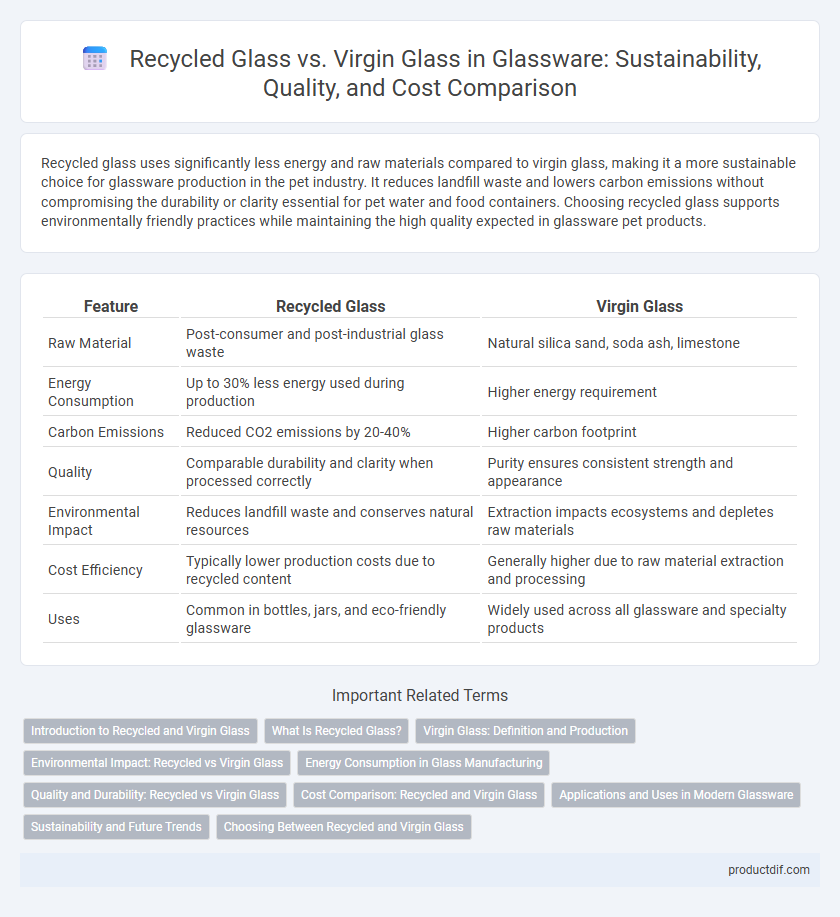Recycled glass uses significantly less energy and raw materials compared to virgin glass, making it a more sustainable choice for glassware production in the pet industry. It reduces landfill waste and lowers carbon emissions without compromising the durability or clarity essential for pet water and food containers. Choosing recycled glass supports environmentally friendly practices while maintaining the high quality expected in glassware pet products.
Table of Comparison
| Feature | Recycled Glass | Virgin Glass |
|---|---|---|
| Raw Material | Post-consumer and post-industrial glass waste | Natural silica sand, soda ash, limestone |
| Energy Consumption | Up to 30% less energy used during production | Higher energy requirement |
| Carbon Emissions | Reduced CO2 emissions by 20-40% | Higher carbon footprint |
| Quality | Comparable durability and clarity when processed correctly | Purity ensures consistent strength and appearance |
| Environmental Impact | Reduces landfill waste and conserves natural resources | Extraction impacts ecosystems and depletes raw materials |
| Cost Efficiency | Typically lower production costs due to recycled content | Generally higher due to raw material extraction and processing |
| Uses | Common in bottles, jars, and eco-friendly glassware | Widely used across all glassware and specialty products |
Introduction to Recycled and Virgin Glass
Recycled glass is made by melting down post-consumer glass waste, significantly reducing energy consumption and raw material extraction compared to virgin glass production. Virgin glass is produced from raw materials such as silica sand, soda ash, and limestone, requiring higher energy input for melting and shaping. Incorporating recycled glass cullet into manufacturing improves sustainability while maintaining the durability and clarity standards of virgin glass products.
What Is Recycled Glass?
Recycled glass, also known as cullet, is glass material reshaped from used containers, bottles, and other glass products that have been collected and processed for reuse. This sustainable material reduces energy consumption by melting at a lower temperature compared to virgin glass made from raw silica sand and soda ash. Utilizing recycled glass in manufacturing decreases landfill waste and lowers carbon emissions, making it a key component in eco-friendly glassware production.
Virgin Glass: Definition and Production
Virgin glass is made from raw materials such as silica sand, soda ash, and limestone, melted at high temperatures in a furnace. This type of glass ensures high purity and consistency, making it ideal for applications requiring stringent quality standards. Virgin glass manufacturing consumes more energy compared to recycled glass but offers unmatched clarity and strength.
Environmental Impact: Recycled vs Virgin Glass
Recycled glass significantly reduces environmental impact by lowering energy consumption by up to 30% compared to virgin glass production. Using recycled glass cuts raw material extraction, preserving natural resources and reducing carbon dioxide emissions by approximately 20-25%. This sustainable practice minimizes landfill waste and conserves natural habitats, making recycled glass an eco-friendly alternative to virgin glass.
Energy Consumption in Glass Manufacturing
Recycled glass reduces energy consumption by up to 30% compared to virgin glass in manufacturing, as it melts at a lower temperature. Using cullet significantly decreases the need for raw materials extraction, lowering carbon emissions and operational costs. Energy-efficient glass production leverages recycled content to promote sustainable industry practices and minimize environmental impact.
Quality and Durability: Recycled vs Virgin Glass
Recycled glass maintains comparable quality and durability to virgin glass, as both types undergo rigorous melting processes that ensure structural integrity. Virgin glass often exhibits slightly higher purity, leading to enhanced clarity and fewer impurities, which may benefit specific applications requiring pristine finishes. Advances in recycling technology continue to close the gap, making recycled glass a sustainable choice without significant compromises in strength or longevity.
Cost Comparison: Recycled and Virgin Glass
Recycled glass typically reduces production costs by up to 30% compared to virgin glass due to lower energy consumption during melting processes. Virgin glass requires raw materials like sand, soda ash, and limestone, increasing material expenses and environmental impact. The cost efficiency of recycled glass is further enhanced by decreased landfill fees and reduced carbon emissions, making it a sustainable and economical choice for manufacturers.
Applications and Uses in Modern Glassware
Recycled glass is primarily used in the production of eco-friendly containers, insulation materials, and decorative glassware, benefiting industries aiming to reduce carbon footprints while maintaining durability and clarity. Virgin glass, favored for high-precision applications like laboratory glassware, optical lenses, and certain food and beverage bottles, offers superior purity and strength. Modern glassware leverages recycled glass to support sustainability, while virgin glass remains essential where chemical stability and flawless transparency are critical.
Sustainability and Future Trends
Recycled glass significantly reduces raw material extraction and energy consumption, cutting carbon emissions by up to 30% compared to virgin glass production. Increasing demand for sustainable packaging drives innovation in recycled glass processing, enhancing quality and expanding applications in food and beverage containers. Future trends suggest a surge in circular economy models and stricter environmental regulations, promoting higher recycled content and boosting the overall sustainability of glassware products.
Choosing Between Recycled and Virgin Glass
Choosing between recycled and virgin glass hinges on environmental impact and quality requirements. Recycled glass reduces energy consumption by up to 30% and lowers carbon dioxide emissions, making it a sustainable choice for eco-conscious consumers. Virgin glass, while offering superior clarity and strength, demands higher raw material extraction, leading to greater ecological footprint.
Recycled Glass vs Virgin Glass Infographic

 productdif.com
productdif.com